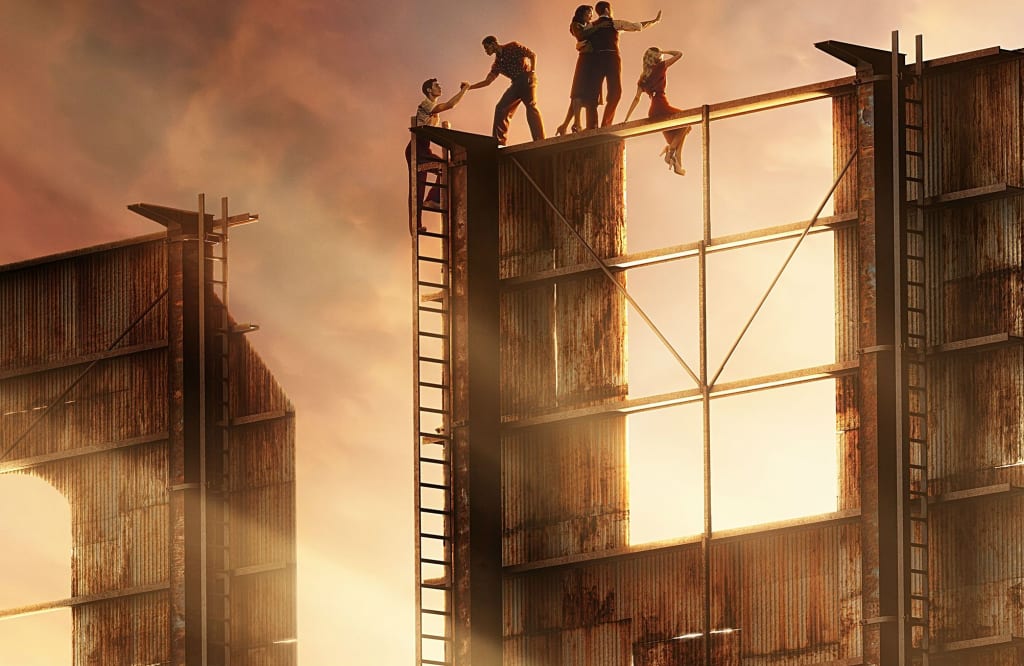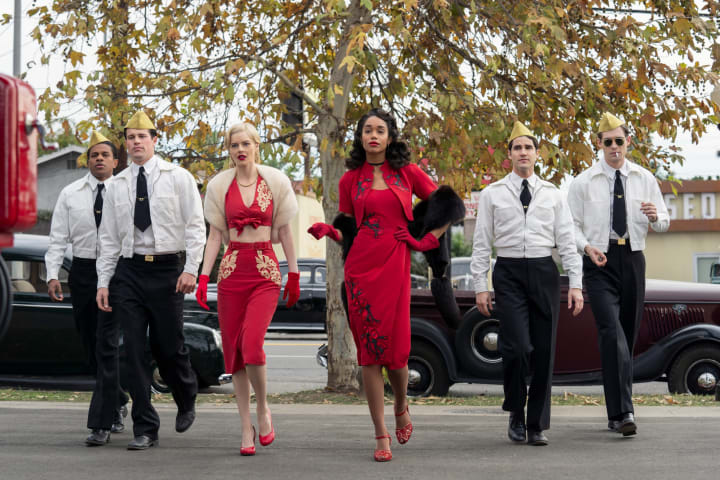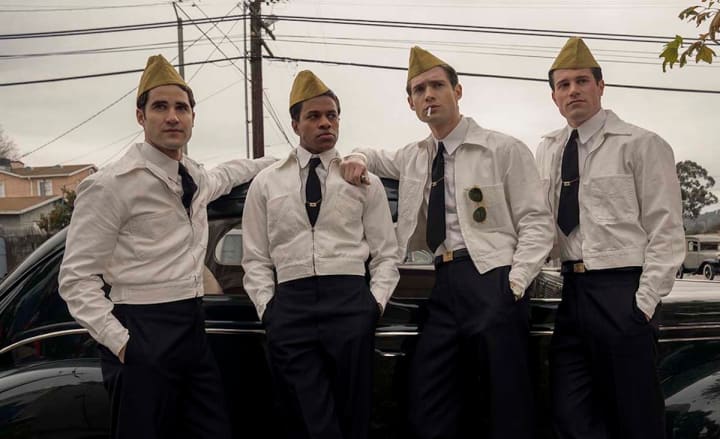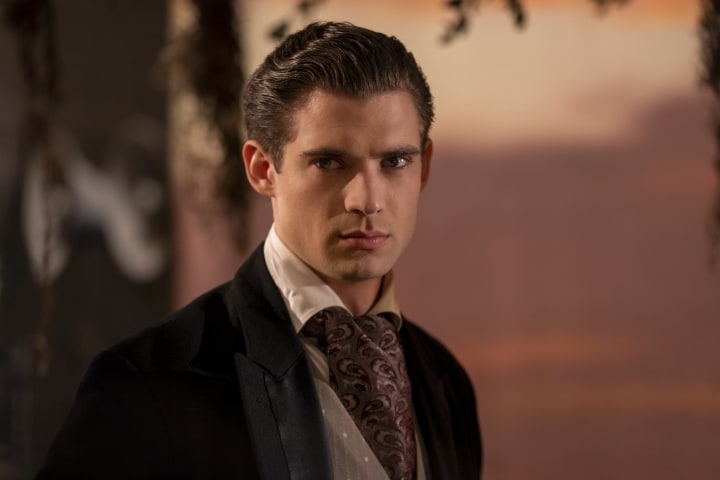The Best Thing About Netflix's 'Hollywood' Is Also Its Biggest Problem
The series takes a few liberties when it comes to the history of Hollywood.

Ryan Murphy's latest project, the Netflix miniseries Hollywood, premiered on the streamer on May 1st, 2020 to mixed reviews. Nevertheless, it has received a slew of Emmy nominations, including Outstanding Lead Actor in a Limited Series or Movie (newcomer Jeremy Pope as Archie Coleman, an aspiring screenwriter).
The series is set in post-World War II Hollywood, where aspiring actors, screenwriters, and directors are willing to make huge sacrifices to live their dreams. To say that the series takes a few liberties when it comes to the history of Hollywood is an understatement. The central plot is entirely fictional; an up-and-coming director named Raymond Ainsley (Darren Criss) helps his black and queer friend (Jeremy Pope) develop his script about Peg Entwistle's career and suicide. This is perfectly acceptable, but what happens later in the series is more worrying than it is empowering.
Entwistle was a real actress who jumped to her death from the H in the Hollywoodland sign in 1932 after failing to land a breakout role. She was twenty-four. Hollywood takes a new spin on this story and changes Peg's story to Meg in a (fictional) feature film written by Archie Coleman (Pope) and directed by Raymond. Archie originally writes his script about Entwistle, a white woman, to prove to Ace Studios that he's a versatile writer. But Raymond, whose girlfriend Camille (Laura Harrier) is an aspiring but oppressed black actress, inspires him to tell the story that really matters to him.

In Meg, a young black actress plans to leap from the Hollywoodland sign after being rejected by the industry because of her race. However, her boyfriend stops her before she can jump. Archie still needs to make a living before the film gets made, so he finds work at a gas station run by Ernie West (who failed to make it as an actor; played by Dylan McDermott). Drivers, many of whom are influential in Hollywood, can request a trip to "Dreamland".
Jack Castello (David Corenswet) is an aspiring actor and war vet who also finds work at the station and is torn about performing sexual favors for those higher up in the industry. He has a young, pregnant wife (Maude Apatow) at home and doesn't want to disappoint her, but he also needs to get his foot in the door and make a living.
One of his trips to Dreamland lands him an encounter with Avis Amberg (Patti LuPone), wife of Ace Amberg (Rob Reiner), who runs Ace Studios. Avis is unsatisfied in more ways than one and agrees to help Jack get an audition. Eventually, she greenlights Meg and ensures that Archie's name is credited. She even gets Camille to star as Meg, even though her daughter Claire Wood (Samara Weaving) also auditioned for the leading role. However, she runs into some trouble casting Jack.
Agent and producer Henry Wilson (Jim Parsons) is based on a real person, and in the show, he delivers scene after withering scene of cold, insensitive evil. As a gay man, he uses his position of power to take advantage of the younger actors he signs. One of these is Roy Fitzgerald (Jake Picking), who is also based on a real person. Wilson bestows upon him a new name: Rock Hudson. (Sound familiar?)

Henry wants Rock to star in the film, even though he's untrained and his audition is terrible. Eventually, Avis gets her way, but her decision is based entirely on a whim. Ace is unconscious in the hospital, so she's given free rein to greenlight pictures, but this situation is unrealistic and doesn't offer much in the way of inspiration. It only reinforces the idea that people in the industry have to get lucky rather than work hard at something (which is true, for the record). Besides, the real progress is made by Ellen Kincaid (Holland Taylor) and Dick Samuels (Joe Mantello), neither of whom receives the credit - or happy endings - that they deserve.
The final episode, aptly titled "A Hollywood Ending", is sugary beyond belief. Not only is the ending predictable, but it's so rushed that the weight of it doesn't have time to register with viewers. To its credit, the episode does fix one glaring issue; when Camille tries to enter the hall for the Oscar ceremony, the guards try to usher her to a side room where she will not be seen. Having spoken to Hattie McDaniels (Queen Latifah) about her experience in this very situation, Camille stands her ground.
Raymond, Jack, and Claire try to defend her by arguing with the guards. Camille calmly but firmly thanks them for their help, but asserts that she doesn't need them to fight her battles for her. She tells security that she has earned a spot in the front row, and she has. This moment is important and succeeds in being empowering because the marginalized character is standing up for herself; she shouldn't have to rely on people more privileged than her to make sure she is given basic rights.

Apart from trying to stuff in way too many characters and too much plot into a seven-episode series, the biggest problem with Hollywood is its deviation from history. The idea on its own is admirable and courageous, but upon execution, it becomes clear that it's hard to pull off successfully. While it attempts to be an inspiring story of overcoming adversity and believing in oneself, the story doesn't consider the negative reactions of viewers who fall into the minorities the series represents.
Archie's success is entirely dependent upon a white male's help, reinforcing the notion of white saviorism. Furthermore, the series gives Anna May Wong a happy ending that she did not see in her real life, thereby taking away from her very real struggles. This portrayal is accentuated by Michelle Krusiec's minimal screen time. In changing the outcome of true events, the series subtracts from the oppression, discrimination, and hatred these people were faced with every day.
Perhaps if the series was a little longer, it could have taken the time to examine these characters' struggles more closely, then spend more time figuring out a believable, sensitive, and more realistic way of overcoming these struggles. Instead, Hollywood skips over many key moments, like Jack's divorce, his rise to becoming a star, the Ambergs' abrupt changes in character (including Claire), and why the Academy decided to award Meg so many Oscars after so many theatres refused to play the picture and even started protests.
About the Creator
Svetlana Sterlin
Svetlana Sterlin is based in Brisbane, Australia, where she writes prose, poetry, and screenplays. The founding editor of swim meet lit mag, she also edits with Voiceworks.
More from Svetlana: https://linktr.ee/svetlanasterlin






Comments
There are no comments for this story
Be the first to respond and start the conversation.